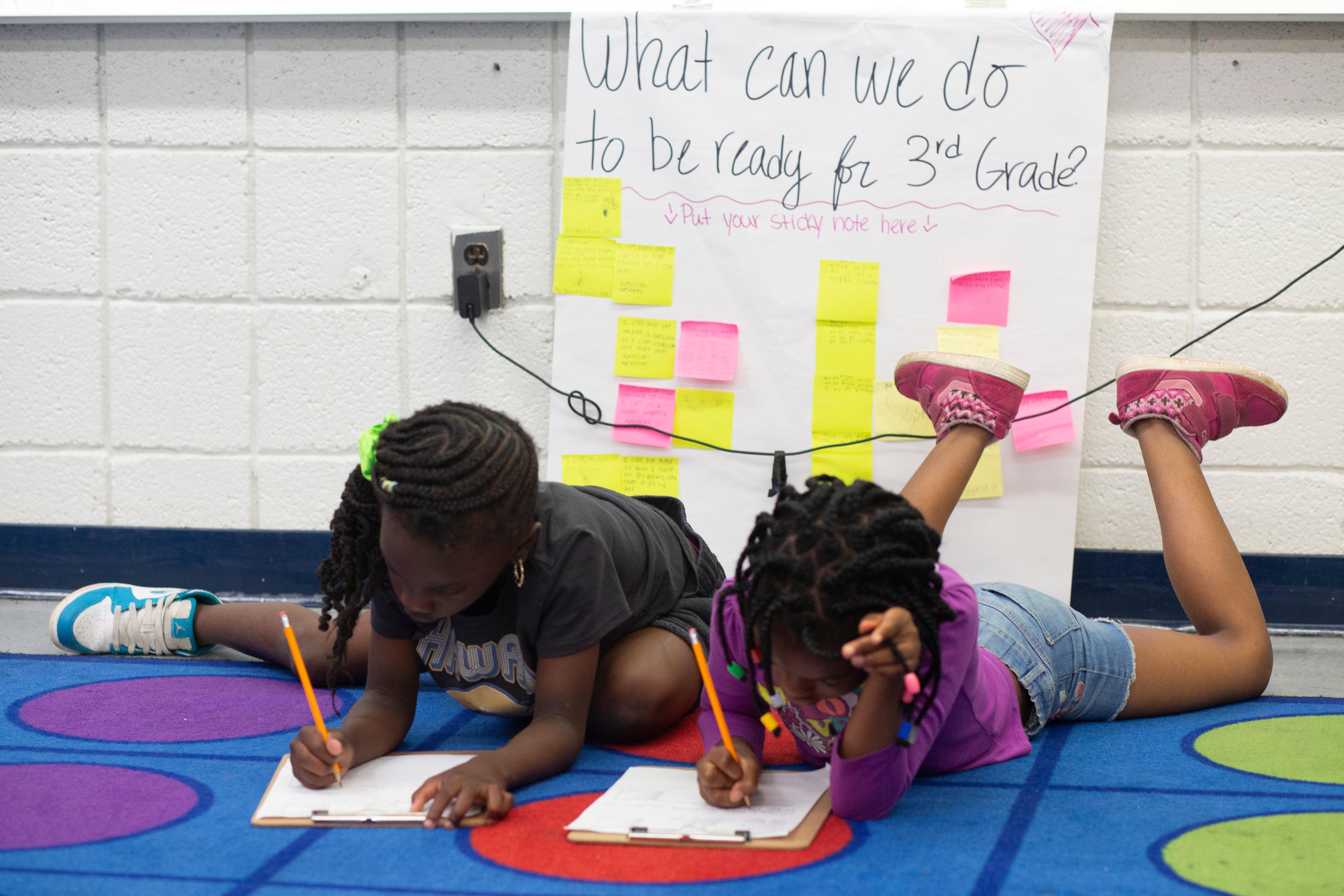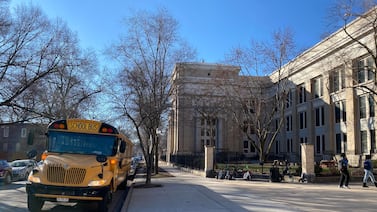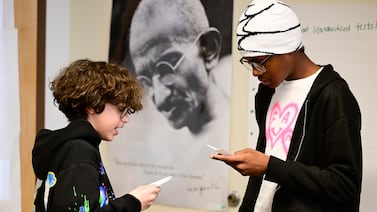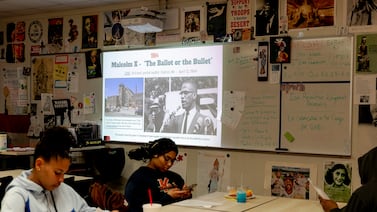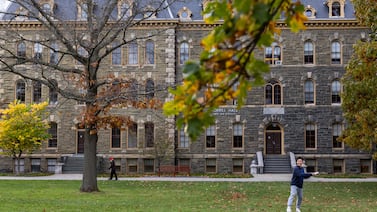In Newark’s North Ward, students in Ms. Murphy’s second grade class at Park Elementary School sat quietly on a colorful rug at the front of the classroom in mid-July, listening to their teacher read a book.
The summer school class was practicing reading comprehension skills by answering questions about the story and summarizing the main ideas.
“Look at the sun, the rain,” said Kathleen Murphy as she showed students the drawings in the book. “Where is our setting?”
Two students quickly raised their hands.
“Outside by a tree!” one student.
“What kind of tree?” Murphy asked the class.
“Oak!” several students shout out, eager to answer.
Murphy’s class is part of Newark Public Schools’ five-week summer school program, one of many efforts across city schools to help students get back on grade level after spring 2022 state test scores showed dismal drops in English language arts and math.
As Newark students get ready to return to class in five weeks, officials are hoping that such initiatives aimed at helping those who have fallen behind will pay off.
Some of those interventions began last spring with high-dosage tutoring during the day at KIPP New Jersey schools. Others – such as Murphy’s class – took place during summer school programs.
About 10,000 public school students were required to attend summer school this year – double the number from last year – with more scattered throughout city charter schools.
In Newark Public Schools, students are required to attend summer school based on attendance, grades, and state test scores. Those who did not attend within the first three days were at risk of losing their seats and high schoolers enrolled in the summer accelerated program needed to attend every day to keep their spots, according to the district.
“The effort to close the achievement gap and accelerate learning is a collective effort,” said Newark Public Schools Assistant Superintendent José Fuentes. “And hopefully we’ll see robust gains from this summer.”
New Jersey students took the state’s standardized test last spring – the first time since 2019 – providing a glimpse into students’ slow recovery after COVID-19 disruptions. The scores pointed to the severity of the pandemic’s toll on student learning and the efforts Newark leaders must take to recover from it.
In spring 2022, only 49% of New Jersey students passed the state’s English language arts test, 27% of Newark public school students, and 47% of the city’s charter school students reached proficiency levels in the same subject.
Newark’s younger students suffered the biggest declines from pre-pandemic levels, with only 19% of Newark Public School third graders and 40% of the city’s charter school third graders reaching proficiency levels on the state’s English language arts test. Third grade is widely viewed as a critical age for reading and a measure of a student’s future academic success. The scores also showed that Newark’s struggles with achieving math proficiency have only grown since the pandemic.
In July, Newark Mayor Ras Baraka declared an “urgent” literacy crisis throughout the city and launched a 10-point Youth Literacy Action plan that calls on local schools, parents, community partners, and programs to get young children reading and writing.
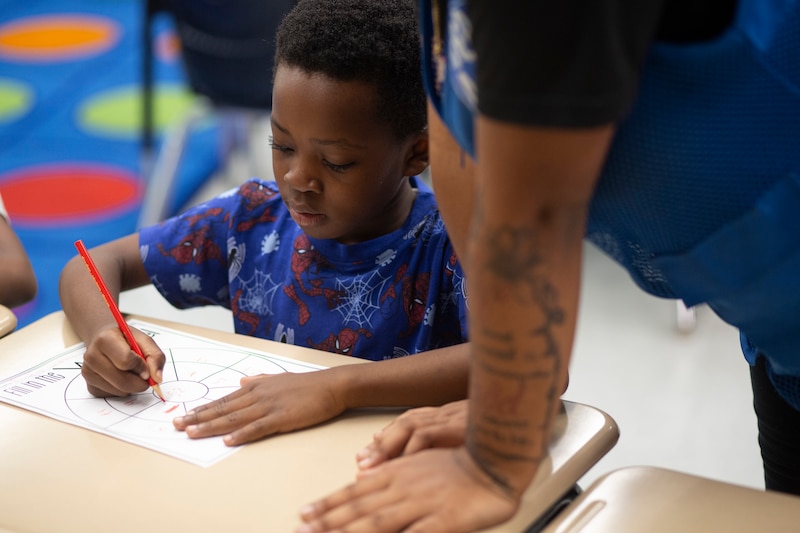
The sobering test scores are part of the crisis that led city educators to develop strategies to refine students’ skills in reading, writing, and math this summer. In the classroom, teachers are working with students who need help practicing handwriting and strengthening reading comprehension skills, while others implement group work that challenges students to discuss different ways to solve math problems.
For public school leaders, home to roughly 38,000 students, federal COVID relief dollars have been the district’s “saving grace” in expanding summer programs to 14 schools this year, said Superintendent Roger León during a press conference in June.
Part of the district’s strategy is ensuring those dollars “last a long time” so they continue to offer tutoring and other recovery support during the school year, León added.
‘Learning happens when students are having fun’
Park Elementary’s summer school principal, Ladylaura Bueno, is responsible for making sure her 127 students required to attend summer classes are there.
The program “moves very quickly,” Bueno said, and missing one week of summer school “is like missing one marking period.”
The goal is for the summer school experience to mirror that of the academic year, Fuentes added. On day one, students are tested in either reading or math and then tested again at the end “to see the efficacy of the program,” Bueno said. Instruction is tailored to each student’s need, making participation a key component of the program.
School leaders like Bueno, normally a vice principal at Salomé Ureña Elementary school, say summer school planning takes months, and ensuring that parents understand the importance of it is part of the work to help students succeed.
“We’re working to engage parents and make sure they understand that their kids aren’t done just because it’s summer,” Fuentes said. “If you miss school, we make calls.”
Developed by Newark Board of Education curriculum experts, the district’s Summer Plus program combines academic and enrichment activities into a full-day summer program for students who will be entering grades one through eight. In the morning, students work on improving math and literacy skills, and in the afternoon, students are free to join extracurricular activities led by partnering organizations in Newark.
“The teacher is the facilitator here and that places the onus on students to solve the problem and find different ways to reach a solution,” Fuentes said.
In one fifth grade class at Park, for example, 12 students who need extra support in math focus on collaborative work and finding ways to solve problems on their own. Then they discuss different solutions with their peers. Students are also pulled from class at different times of the day and placed in smaller groups with teachers who provide more targeted support in reading and math.
During the regular academic year, León said they plan to implement a similar structure and provide tutoring for students throughout the school day – a requirement under Baraka’s 10-Point Action Plan.
Ultimately, “learning happens when students are having fun and are engaging in hands-on activity,” Fuentes said.
Newark charter looks for ways to refine student learning
Overall, Newark’s trends showed that students performed lower in math state tests than in English language arts. That’s one reason Achieve Community Charter School is focusing on improving student performance in math as part of its summer program.
Achieve students entering grades one through seven are tested during the first week of school to assess their needs, said Tina Leake, Achieve’s summer school site director. Based on that data, students are placed in tutoring groups that target specific skills in math and literacy.
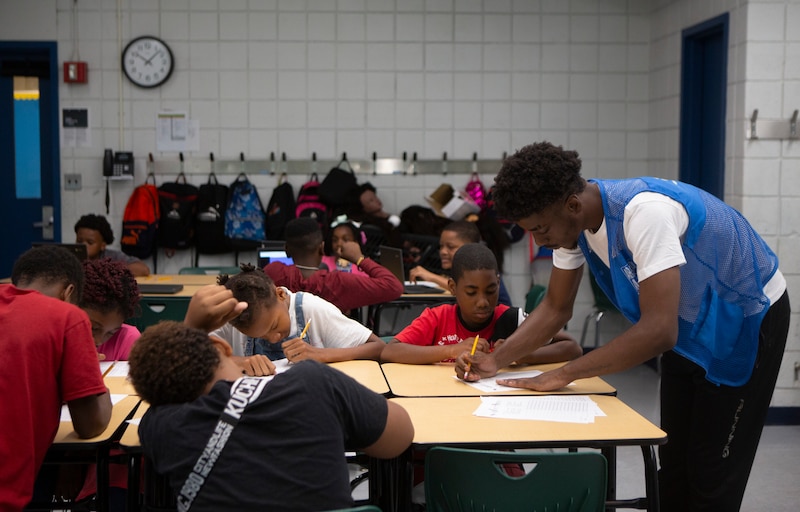
Summer tutoring can include group instruction or one-on-one learning during the school day, in addition to instruction in the classroom in the morning, said summer school principal Patrice Norwood. School leaders and teachers then evaluate their tutoring strategy on a daily basis as students move through the program.
“They’re not going to stay in the same group for the whole program, or the whole week or even daily,” Norwood added. “It might change based on what we’re seeing.”
Keeping Achieve’s 184 summer school students engaged is also part of the work to support student learning, Norwood said.
Through a partnership with After School All Stars, a nonprofit organization working with low-income youth, students are spread throughout 10 classrooms with one instructor and an “All Star” tutor who helps out during the small group hour built into the day. In their classrooms, students rotate among three different groups: instruction with a teacher, iReady lessons in math or reading on their Chromebooks, and group work specific to students’ needs.
Students may also need extra support in skills not usually worked on during the school day such as handwriting or adding and subtracting. Small groups and tutoring are a way to build those skills, Norwood said.
School leaders also keep a close eye on students’ emotional and mental health and work with community partners to support children and their families. Recently, for example, one of Achieve’s students was dealing with the loss of a family member and school leaders offered to provide therapy and support services for the family.
“We’re here to help both students and their families,” Norwood said.
Their approach to supporting students and evaluating and reassessing their program is part of “the love students get,” she added.
KIPP schools maximize impact of tutoring
For KIPP New Jersey Schools, which serves students in Newark and Camden, the work to boost student performance began this spring with two new partnerships that helped provide high-dosage tutoring in math and reading. That goes along with recent research that shows intensive tutoring can be effective in helping students improve in problem areas.
Two of the charter school network’s elementary schools partnered with the New Jersey Tutoring Corps, a statewide nonprofit created to address academic recovery needs post pandemic, to provide in-person tutoring to 100 students. The preliminary data for elementary student outcomes is “promising” and reflects on the efforts of the corps to provide targeted tutoring, said Joe Hejlek, director of wraparound services at KIPP New Jersey.
Overall, the state’s Tutoring Corps served 500 students across New Jersey schools during the 2022-23 pilot. The percentage performing at grade level in math improved from 16% to 40%, and from 23% to 40% in literacy across all grade levels, the Tutoring Corps reported.
But Hejlek says the program’s success in KIPP New Jersey schools is in part linked to student attendance.
“There’s a very direct correlation between the number of sessions students participate in and the amount of growth that they make,” he said.
At the middle school level, three KIPP New Jersey schools partnered with Tutored by Teachers, an organization that provides personalized virtual tutoring for students. Nikeya Stuart is a school leader at TEAM Academy working with students from fifth through eighth grade. At TEAM, 20 students worked with Tutored by Teachers instructors this spring and received virtual tutoring in math twice a week during the school day.
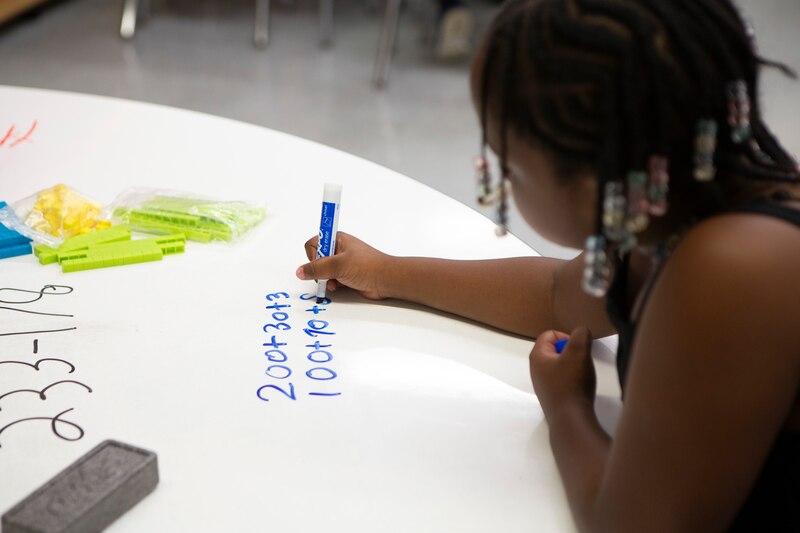
Students were chosen to participate in the program if they were within 10 points of passing the state’s math test and had 95% daily attendance or higher during the academic year, Stuart said. The goal was to choose students who would commit to tutoring “so the program could really yield the results that we were hoping that it would,” Stuart added.
She found sixth and seventh graders were more engaged than students in fifth and eighth grade but noted the importance of finding “a program that works for each student.”
Not all students will benefit from online learning after the pandemic and “if a student did not like learning behind the computer, they may not be the ideal student” for virtual tutoring, Stuart said.
By learning about the impact the tutoring efforts had on students, the charter network is looking to scale up its tutoring program by expanding it to five more schools this year. But it remains unclear whether there will be funding to continue such high-dosage tutoring and other avenues for student academic recovery.
”It’s just a question of making sure we have enough tutors to meet demand,” Hejlek said, “and then making sure we’re being thoughtful about how we select the students and how we set our schools up to maximize the impact of the tutoring.”
Jessie Gómez is a reporter for Chalkbeat Newark, covering public education in the city. Contact Jessie at jgomez@chalkbeat.org.


